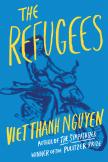Searching for connections in the Vietnamese diaspora
Viet Thanh Nguyen’s short story collection The Refugees, the follow-up to his Pulitzer Prize–winning novel The Sympathizer, arrives at a time in the modern era when there have never been more refugees. Nguyen himself was a refugee from Vietnam, arriving in the United States as a child. His phenomenal collection asks: Do others see the refugees among us, and how do refugees see themselves? What violent memories and losses do they carry in their hearts and bodies? Never before has Joan Didion’s dictum, “We tell ourselves stories in order to live,” been so gracefully demonstrated.
His stories explore how individuals form tenuous connections in a community carved up by politics, war and the vastness of geography; communication and its limits is a recurring theme. Yet the characters also confront problems that are not limited to refugees: dementia, for example, in “I’d Love You to Want Me.”
In “The Other Man,” the reader encounters a liminal state that nearly all of the book’s characters inhabit: “When his partner looked toward the window as well, Liem waved in return, and for a moment there were only the three of them, sharing a fleeting connection. Then the men passed by, and long after they had vanished into the shadows he was still standing with his hand pressed to the window, wondering if someone behind blinds and curtains might be watching.”
The desire for connection and the challenge of invisibility is paramount. In the opening story “Black-Eyed Women,” the narrator, a ghostwriter, confronts her mother’s idea that telling the truth is dangerous, a type of exposure that could lead to imprisonment. But the story also includes a miracle, one that the narrator struggles to believe: her brother, killed as the family escaped Vietnam more than two decades ago, comes back in the flesh as a ghost to visit. His very real body is even damp from, her mother claims, swimming to their house in the United States all the way from the ocean where he died a violent death. The narrator looks for plausible explanations for all of the signs her mother brings her until ultimately coming face to face with her beloved brother.
The penultimate story in this collection, “Someone Else Besides You,” concludes in a way that could end each story, “He was waiting, just like us, for what was to come.”
This article also appeared in print, under the headline “Searching for connections in the Vietnamese diaspora,” in the February 20, 2017, issue.









